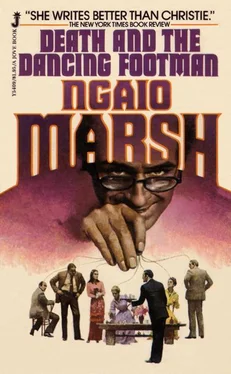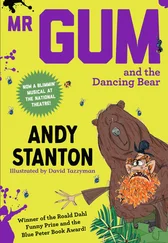Ngaio Marsh - Death And The Dancing Footman
Здесь есть возможность читать онлайн «Ngaio Marsh - Death And The Dancing Footman» — ознакомительный отрывок электронной книги совершенно бесплатно, а после прочтения отрывка купить полную версию. В некоторых случаях можно слушать аудио, скачать через торрент в формате fb2 и присутствует краткое содержание. Жанр: Классический детектив, на английском языке. Описание произведения, (предисловие) а так же отзывы посетителей доступны на портале библиотеки ЛибКат.
- Название:Death And The Dancing Footman
- Автор:
- Жанр:
- Год:неизвестен
- ISBN:нет данных
- Рейтинг книги:4 / 5. Голосов: 1
-
Избранное:Добавить в избранное
- Отзывы:
-
Ваша оценка:
- 80
- 1
- 2
- 3
- 4
- 5
Death And The Dancing Footman: краткое содержание, описание и аннотация
Предлагаем к чтению аннотацию, описание, краткое содержание или предисловие (зависит от того, что написал сам автор книги «Death And The Dancing Footman»). Если вы не нашли необходимую информацию о книге — напишите в комментариях, мы постараемся отыскать её.
Death And The Dancing Footman — читать онлайн ознакомительный отрывок
Ниже представлен текст книги, разбитый по страницам. Система сохранения места последней прочитанной страницы, позволяет с удобством читать онлайн бесплатно книгу «Death And The Dancing Footman», без необходимости каждый раз заново искать на чём Вы остановились. Поставьте закладку, и сможете в любой момент перейти на страницу, на которой закончили чтение.
Интервал:
Закладка:
His entrance into Jonathan’s library was effective, for he had motored over Cloudyfold bare-headed with the driving window open, and the north wind had tossed his hair into elf-locks. He usually did the tossing himself. He advanced upon Jonathan with his hand outstretched, and an air of gay hardihood.
“An incredible night,” he said. “Harpies and warlocks abroad. Most stimulating.”
“I trust,” said Jonathan, shaking his hand and blinking up at him, “that it hasn’t stimulated your Muse. I cannot allow her to claim you this evening, Aubrey.”
“Oh God!” said Mandrake. He always made this ejaculation when invited to speak of his writing. It seemed to imply desperate aesthetic pangs.
“Because,” Jonathan continued, “I intend to claim your full attention, my dear Aubrey. Our customary positions are reversed. For to-night — yes, and for tomorrow and the next day — I shall be the creator, and you the audience.” Mandrake darted an apprehensive glance at his host.
“No, no, no,” Jonathan cried, steering him to the fireside, “don’t look so alarmed. I’ve written no painful middle-age belles-lettres , nor do I contemplate my memoirs. Nothing of the sort.”
Mandrake sat opposite his host by the fire. Jonathan rubbed his hands together and suddenly hugged them between his knees. “Nothing of the sort,” he repeated.
“You look very demure,” said Mandrake. “What are you plotting?”
“Plotting! That’s the word! My dear, I am up to my ears in conspiracy!” He leant forward and tapped Mandrake on the knee. “Come now,” said Jonathan, ”tell me this. What do you think are my interests?”
Mandrake looked fixedly at him. “Your interests ?” he repeated.
“Yes. What sort of fellow do you think I am? It is not only women, you know, who are interested in the impressions they make on their friends. Or is there something unexpectedly feminine in my curiosity? Never mind. Indulge me so far. Come, now.”
“You skip from one query to another. Your interests, I should hazard, lie between your books, your estate, and — well — I imagine you are interested in what journalists are pleased to call human contacts.”
“Good,” said Jonathan. “Excellent. Human contacts. Go on.”
“As for the sort of fellow you may be,” Mandrake continued, “upon my word, I don’t know. From my point of view a very pleasant fellow. You understand things, the things that seem to me to be important. You have never asked me, for instance, why I don’t write about real people. I regard that avoidance as conclusive.”
“Would you say, now, that I had a sense of the dramatic?”
“What is the dramatic? Is it merely a sense of theatre, or is it an appreciation of aesthetic climax in the extroverted sense?”
“I don’t know what that means,” said Jonathan impatiently. “And I’m dashed if I think you do.”
“Words,” said Mandrake. “Words, words, words.” But he looked rather put out.
“Well, damn it, it doesn’t matter two ha’p’th of pins. I maintain that I have a sense of drama in the ordinary unclassy sense. My sense of drama, whether you like it or not, attracts me to your own work. I don’t say I understand it, but for me it’s got something . It jerks me out of my ordinary reactions to ordinary theatrical experiences. So I like it.”
“That’s as good a reason as most.”
“All right. But wait a bit. In me, my dear Aubrey, you see the unsatisfied and inarticulate artist. Temperament and no art. That’s me. Or so I thought, until I got my Idea. I’ve tried writing and I’ve tried painting. The results have on the whole been pitiable — at the best negligible. Music — out of the question. And all the time, here I was, an elderly fogey plagued with the desire to create. Most of all have I hankered after drama, and at first I thought my association with you, a delightful affair from my point of view, I assure you, would do the trick; I would taste, at second hand as it were, the pleasures of creative art. But no, the itch persisted and I was in danger of becoming a disgruntled restless fellow, a nuisance to myself, and a bore to other people.”
“Never that,” murmured Mandrake, lighting a cigarette.
“It would have been the next stage, I assure you. It threatened. And then, in what I cannot but consider an inspired moment, my dear Aubrey, I got my Idea.”
With a crisp movement Jonathan seized his glasses by their nose-piece and plucked them from his face. His eyes were black and extremely bright.
“My Idea,” he repeated. “One Wednesday morning four weeks ago, as I was staring out of my window here and wondering how the devil I should spend the day, it suddenly came to me. It came to me that if I was a ninny with ink and paper, and brush and canvas, and all the rest of it, if I couldn’t express so much as a how-d’ye-do with a stave of music, there was one medium that I had never tried.”
“And what could that wonderful medium be?”
“Flesh and blood.”
“What!”
“Flesh and blood!”
“You are not —” said Mandrake—“I implore you to say you are not going in for social welfare.”
“Wait a bit. It came to me that human beings could, with a little judicious arrangement, be as carefully ‘composed’ as the figures in a picture. One had only to restrict them a little, confine them within the decent boundaries of a suitable canvas, and they would make a pattern. It seemed to me that given the limitations of an imposed stage, some of my acquaintances would at once begin to unfold an exciting drama; that, so restricted, their conversation would begin to follow as enthralling a design as that of a fugue. Of course the right — how shall I put it? — the right ingredients must be selected, and this was where I came in. I would set my palette with human colours, and the picture would paint itself. I would summon my characters to the theatre of my own house, and the drama would unfold itself.”
Читать дальшеИнтервал:
Закладка:
Похожие книги на «Death And The Dancing Footman»
Представляем Вашему вниманию похожие книги на «Death And The Dancing Footman» списком для выбора. Мы отобрали схожую по названию и смыслу литературу в надежде предоставить читателям больше вариантов отыскать новые, интересные, ещё непрочитанные произведения.
Обсуждение, отзывы о книге «Death And The Dancing Footman» и просто собственные мнения читателей. Оставьте ваши комментарии, напишите, что Вы думаете о произведении, его смысле или главных героях. Укажите что конкретно понравилось, а что нет, и почему Вы так считаете.












